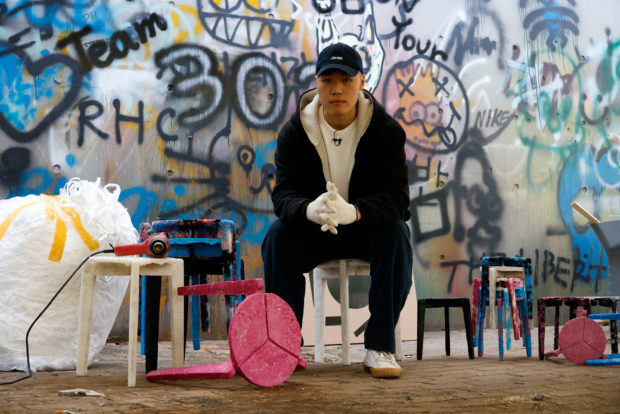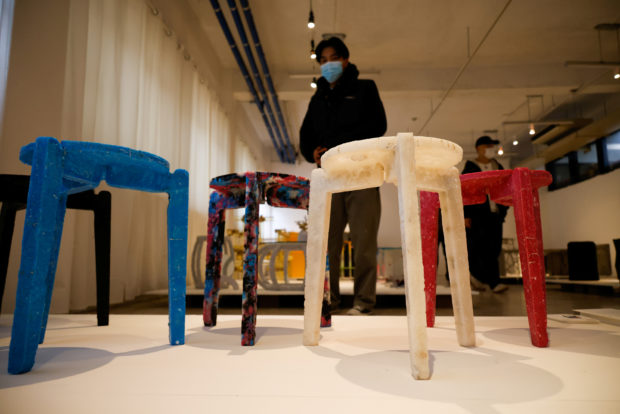The face mask seat: a South Korea student’s bid to recycle in COVID times

Kim Ha-neul, who is majoring in furniture design, poses for photographs with his upcycled stools made from discarded protective masks in Uiwang, South Korea, December 7, 2020. REUTERS/Kim Hong-Ji
UIWANG, South Korea — How many disposable masks does it take to make a stool?
Kim Ha-neul knows it takes 1,500.
Bothered by the waste caused by disposable face masks, many of which are made of polypropylene, the South Korean furniture design student has come up with an eco-friendly solution, melting them to make stools he calls “Stack and Stack.”
“Plastic is recyclable, so why don’t we recycle face masks, which are made of plastic?” the 23-year-old said.
In June, Kim set up a mask collection box at his school, the Kaywon University of Art and Design in Uiwang City, south of Seoul. He has since gathered 10,000 used masks, and has received more than a tonne of defective ones from a factory as well.
To lessen the risk of coronavirus transmission, Kim keeps them in storage for at least four days. Then, removing elastic bands and wires, he wields a heat gun over the masks in a mould, melting them down at temperatures over 300 degrees Celsius (570 degrees Fahrenheit).

Upcycled stools from discarded protective masks by Kim Ha-neul, majoring in furniture design, are displayed at a graduation exhibition in Uiwang, South Korea, December 7, 2020. REUTERS/Kim Hong-Ji
The result? Three-legged stools 45cm (18 inches) recycled from white, pink, blue and black masks, which Kim displayed in his graduation exhibition.
Next, Kim hopes to make other furniture pieces from the recycled masks such as a chair, table or some lights. He is also urging the government and private companies to recycle face masks by setting up a separate box for their collection.
In September alone, South Korea produced more than a billion face masks for domestic use, government data showed.
Though the stools are not yet for sale, fellow students were impressed by the idea and rough-surfaced design.
“It has such a strong message,” said art student Park Sung-chan, 20. “This will remind us what we’ve been through in 2020 with the coronavirus and is also environmentally friendly.”
For more news about the novel coronavirus click here.
What you need to know about Coronavirus.
For more information on COVID-19, call the DOH Hotline: (02) 86517800 local 1149/1150.
The Inquirer Foundation supports our healthcare frontliners and is still accepting cash donations to be deposited at Banco de Oro (BDO) current account #007960018860 or donate through PayMaya using this link.